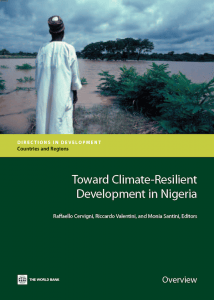Cervigni, Raffaello, Riccardo Valentini, and Monia Santini, eds. 2013.
Toward Climate-Resilient Development in Nigeria. Directions in Development: countries and regions.
Washington, DC: World Bank.
Nigeria needs to protect itself from climate-related shocks. The 2012 floods were an abrupt reminder of the vulnerability of its communities and infrastructure to natural disasters.
For the past two years, the Federal Government of Nigeria and the World Bank have collaborated to analyze the specific challenges posed by climate change in agriculture and water resources management.
The book Toward Climate-Resilient Development in Nigeria summarizes the final results of the analysis, with a sobering message on the climate change impacts that can be expected if timely actions are not taken.
Such partnership led also to the implementation of the project Nigeria – Climate Risk Analysis, which involved a team of CMCC scientists from different divisions (IAFENT, ISC, CIP, SERC) and local consultants, working together during 2011 and 2012.
The book provides a comprehensive overview of the likely impacts of climate change on sectors that are strategic for the growth of Nigeria’s economy, such as agriculture, livestock, and water resource management, while highlighting the promising opportunities to build resilience.
The book proposes 10 practical short-term priority actions, as well as complementary longer-term initiatives and methodological innovations.
This book was prepared by a World Bank team led by Raffaello Cervigni and including (in alphabetical order) Amos Abu, Abimbola A. Adubi, Joseph Ese Akpokodje, Benedicte Marie Cecile Augeard, Ademola Braimoh, Stephen Danyo, Irina Dvorak, Erik Magnus Fernstrom, Francesca Fusaro, Sarwat Hussain, Ella Omomene Iklaga, Anushika Karunaratne, Rikard Liden, Stephen Ling, Kiran D. Pandey, Beula Selvadurai, and Shobha Shetty.
The analysis is based on a consulting report prepared by a team of researchers of the Euro-Mediterranean Center on Climate Change (CMCC), led by Riccardo Valentini and including (in alphabetical order) Francesco Bosello, Jaroslav Mysiak, Monia Santini, Pasquale Schiano, Enrico Scoccimarro, and Donatella Spano. The extended CMCC team included Ahmed Balogun, Edoardo Bucchignani, Lorenza Campagnolo, Gianluca Carboni, Fabio Eboli, Chibueze Emenike, Andrea Gallo, David Onemayin Jimoh, Valentina Mereu, Myriam Montesarchio, Antonio Navarra, and Antonio Trabucco.
Read an extract from the Overview of the book:
«If not addressed in time, climate change is expected to exacerbate Nigeria’s current vulnerability to weather swings and limit its ability to achieve and sustain the objectives of Vision 20: 2020. But there is a lot that can be done, starting now, to avoid such a damaging outcome. This is the overarching message of Toward Climate-Resilient Development in Nigeria.
The likely impacts of climate change include the following:
- Long-term reduction in crop yields of 20-30 percent
- Declining productivity of livestock, with adverse consequences on livelihoods and pastoralism
- Large increases in food imports
- Worsening prospects for food security, particularly in the north and the southwest
- Long-term decline in GDP of up to 4.5 percent
The impacts may be worse if economic diversification away from agriculture happens more slowly than anticipated by Vision 20: 2020, or if there is too little irrigation to counter the effects of rising temperatures on rain-fed agriculture. Equally important, the study argues that investment decisions made on the basis of historical climate data may end up being wrong: projects that ignore climate change may be under- or over-designed, with economic losses of 20-40 percent of capital invested in irrigation or hydropower projects.
For the past two years, the Federal Government of Nigeria and the World Bank have collaborated to analyze the specific challenges posed by climate change in agriculture and water resources management, with a view to identifying viable solutions for adaptation. This effort has brought together participants from government, academia, the private sector, and civil society.
Toward Climate-Resilient Development in Nigeria spells out the technological and management options available to Nigeria for achieving climate resilience. In particular, the book explores -at first not just for Nigeria but also for Sub-Saharan Africa- the application of a robust decision-making approach to enhance the resilience of key sectors such as irrigation and hydropower.
The study proposes 10 practical, short-term priority actions, as well as complementary longer-term initiatives, that could help to mitigate the threat posed by climate change.
Building climate resilience will increasingly be central to Nigeria’s efforts to achieve the ambitious goals the nation has set for itself in the Vision 20: 2020 documents. This study provides practical, evidence-based solutions to inform and nurture the debate and inform policy making for sustainable national development».
From: Cervigni, Raffaello, Riccardo Valentini, and Monia Santini, eds. 2013. Toward Climate-Resilient Development in Nigeria. Directions in Development: countries and regions. Washington, DC: World Bank.
CMCC Institutes- European Institute on Economics and the Environment
- Institute for Climate Resilience
- Institute for Earth System Predictions
CMCC Divisions



